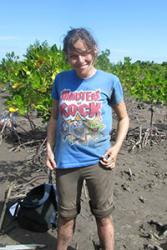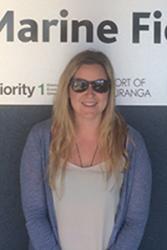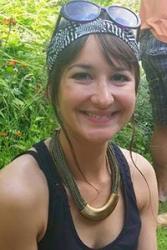Commonwealth Scholarship Success for Marine Science Graduates bound for New Zealand
Three �鶹��ý����� students are among eight to have been awarded Commonwealth Scholarships this year.
The Scholarships and Commission are awarded for postgraduate study and professional development to Commonwealth citizens, providing opportunities for student from developing countries to study at �鶹��ý�����, and Bangor graduates to study overseas.
Charli Mortimer, Amrit Dencer-Brown and Helen Cadwallader, all MSc graduates from the will now be able to undertake their PhDs in New Zealand in 2016.
According to Charli Mortimer:
 Charli Mortimer among mangroves in East Africa.“If there’s one thing you can safely say about Bangor graduates from the M.Sc in (MEP) and M.Sc in , it’s that we are everywhere! Especially from my point of view these days, and I mean that literally as I’m currently sat at my desk at the Joint Nature Conservation Committee (JNCC) looking at the back of the head of one of my fellow graduates from MEP. There’s just no shaking them! If you’d have told me three years ago when I began the MSc course at the School of Oceans Sciences that I would be awarded a Commonwealth Scholarship to study for a PhD in New Zealand, I would have been dubious to say the least. (Incidentally my supervisor Dr James Bell is a former Bangor graduate, as are two of the PhD students I’ll be working with, and so is the Head of School there: are you starting to get the picture?) But the MSc course at �鶹��ý����� can do that for you. When I started the MSc, nervously armed with enthusiasm and an undergraduate degree in Social Anthropology, I had little academic experience of Marine Biology to speak of. Yet in the last three years, I’ve researched carbon storage in mangroves in East Africa and worked for �鶹��ý����� as an overseas researcher on a Darwin Initiative funded Marine Protected Area project in the Cayman Islands, and I’ve helped coordinate a coral reef monitoring project on a remote island in Indonesia and worked for an organisation that advises the government about marine conservation in offshore UK waters. In short, I’ve been busy!
Charli Mortimer among mangroves in East Africa.“If there’s one thing you can safely say about Bangor graduates from the M.Sc in (MEP) and M.Sc in , it’s that we are everywhere! Especially from my point of view these days, and I mean that literally as I’m currently sat at my desk at the Joint Nature Conservation Committee (JNCC) looking at the back of the head of one of my fellow graduates from MEP. There’s just no shaking them! If you’d have told me three years ago when I began the MSc course at the School of Oceans Sciences that I would be awarded a Commonwealth Scholarship to study for a PhD in New Zealand, I would have been dubious to say the least. (Incidentally my supervisor Dr James Bell is a former Bangor graduate, as are two of the PhD students I’ll be working with, and so is the Head of School there: are you starting to get the picture?) But the MSc course at �鶹��ý����� can do that for you. When I started the MSc, nervously armed with enthusiasm and an undergraduate degree in Social Anthropology, I had little academic experience of Marine Biology to speak of. Yet in the last three years, I’ve researched carbon storage in mangroves in East Africa and worked for �鶹��ý����� as an overseas researcher on a Darwin Initiative funded Marine Protected Area project in the Cayman Islands, and I’ve helped coordinate a coral reef monitoring project on a remote island in Indonesia and worked for an organisation that advises the government about marine conservation in offshore UK waters. In short, I’ve been busy!
“Next February I will begin a PhD at Victoria University of Wellington working on sponges on coral reefs in the Indo-Pacific, and I can honestly say that the high quality learning and support that I received from my lecturers during my MSc (and for some time afterwards) have made this all possible. I’m looking forward to the next three years of my career in Marine Biology and the countless Bangor graduates I will meet along the way.”
Helen Cadwallader studied the relationship between cleaner wrasse and thresher sharks during her MSc at �鶹��ý�����.
 Helen Cadwallader at the University of Waikato Coastal Marine Field Station She explains:
Helen Cadwallader at the University of Waikato Coastal Marine Field Station She explains:
“I’m working on the movement ecology of the short tail Stingray in a New Zealand estuarine environment and human impacts, based at the University of Waikato Coastal Marine Field Station in Tauranga, in the Bay of Plenty. My project is part of the new Apex Predator Project at the field station ( ) I’ve also recently spent some time working as crew on fishing charter and dolphin swimming boats here in New Zealand before beginning the PhD course. I could not have got here and won a Commonwealth Scholarship without the MSc Marine Biology course at �鶹��ý�����. I learned so many research and writing skills that I am now using all of the time, I’m also indebted to the staff who were and continue to be so supportive.”
Amrit Dencer Brown currently works as a Research Assistant at Edinburgh Napier University.
“I am really excited to be moving to New Zealand and conducting my PhD research there,’ she says.
“My research is on mangrove socio-ecology. I will be studying at Auckland University of Technology, which has an active mangrove research group. I am looking at local perceptions of different user groups of the mangroves and how the current management practices are affecting the ecology of the area. While studying the MSc in Marine Biology at �鶹��ý�����, I conducted my research project on mangroves in Zanzibar, and got to know the Edinburgh collaborators who work with Bangor in Kenya. I  Amrit Dencer Brown will be studying at Auckland University of Technology.began working on a freelance basis on a literature review for a chapter of a book on mangrove services and this turned into a full-time role for me at Edinburgh Napier University and I am a co-author on the chapter. I have also been working with academics across the university on Teaching Fellows projects involving the student experience and run a first year lab in Environmental Biology. Therefore having the opportunity to conduct my Masters research in Zanzibar through �鶹��ý����� led to where I am today. �鶹��ý����� staff have been inspirational to me in the work they do, both as researchers and lecturers and I hope that we have many chances to collaborate in the future.”
Amrit Dencer Brown will be studying at Auckland University of Technology.began working on a freelance basis on a literature review for a chapter of a book on mangrove services and this turned into a full-time role for me at Edinburgh Napier University and I am a co-author on the chapter. I have also been working with academics across the university on Teaching Fellows projects involving the student experience and run a first year lab in Environmental Biology. Therefore having the opportunity to conduct my Masters research in Zanzibar through �鶹��ý����� led to where I am today. �鶹��ý����� staff have been inspirational to me in the work they do, both as researchers and lecturers and I hope that we have many chances to collaborate in the future.”
Dr John Turner, Director Postgraduate Taught Courses and Postgraduate Research in the School of Ocean Sciences commented:
“To win a Commonwealth scholarship, a student must make contact with a potential doctoral supervisor, develop a project proposal and receive an offer of a place at their preferred university in New Zealand and then apply for the Scholarship’ reports.”
“The awards are highly competitive, and the success of Charli, Helen and Amrit this year demonstrates the experience that they and many others gain while studying at Bangor, and often by working on our research projects around the world after graduation.
“The School has strong links with New Zealand universities, such as Victoria University of Wellington, where two of our graduates are now senior staff (Assoc Profs. Simon Davy and James Bell) and we have long supplied them with outstanding PhD students from our M.Sc courses (Laura Wicks, Gareth Williams, Katie Hillyer, Joe Marlow). It works both ways – Dr Gareth Williams did his Bangor MEP MSc research project and then a PhD in New Zealand, and after a period of postdoctoral work in California, has returned to Bangor as a new member of staff in the School of Ocean Sciences!”
Publication date: 5 January 2016
